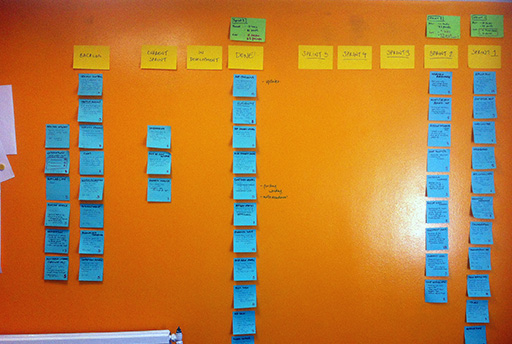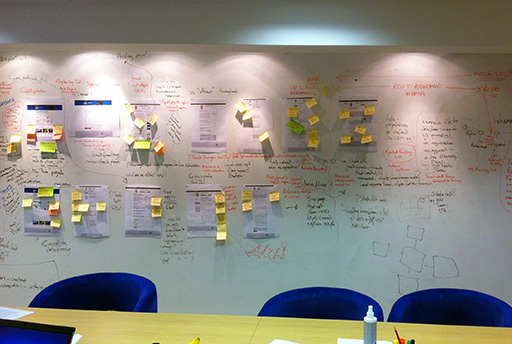Innovate UK
A small team tasked with understanding the process of applying for public sector funding. Our alpha prototype would then demonstrate how the process could be taken online as a "Digital by Default" service.
tl;dr
My role was to work as part of a multi-disciplined sprint team, following the Digital by Default Service Standard. The project not only passed alpha assessment, but also changed the way in which alpha assessments were scored.
Key skills and technologies
- Government Service Design Manual methodology and delivery;
- Swig/HTML, SCSS/CSS and JavaScript;
- Sails.js and WebSockets;
- User testing and GDS alpha assessment.
The project
Following an initial discovery phase, the alpha phase of the project focused on further understanding the service and designing an end-to-end solution. This solution, together with user feedback, would be presented to GDS for alpha assessment before moving into beta.
Our methodology needed to follow the principles set out in the Digital by Default Service Standard. Thus, my role would be to form part of a multi-disciplined sprint team, which rapidly iterated on a design solution that was based on research and feedback from user testing.

After our initial stakeholder meetings, we set about refining the user stories that would be prioritized for each sprint. This was originally done on post-it notes and moved to Trello to allow us to share progress with others. With such a complicated service, compared to something like taxing your vehicle, we had to make sure we had understood and prioritised our sprint stories to ensure the prototype would demonstrate a viable end-to-end service.
During the first sprint, we decided the prototype should be built using the Sails framework. Sails offered us a number of features out-of-the-box the key one being WebSockets, which could be used to handle the realtime communications of the application process. As Sails is a framework for Node.js, we soon settled on using Swig for the templating engine. The team had experience using similar templating engines such as Twig and Jinja, which would speed things up.
Working as part of a small team meant that my role would need to flex around our focus for the day. Early in the sprint this would involve being part of discussions around design patterns, which I would later be implementing. Towards the end of the sprint I would be helping with user testing and gathering initial feedback. This full inclusion of every member of the team meant we could minimize the feedback loop and iterate on the prototype faster.

Each sprint would conclude with a retrospective that allowed us to identify things that went well and highlight areas that could be improved. These improvements would be carried forward into the next sprint planning day. Several sprints later, we had an end-to-end prototype with a plan for moving into beta. Both of which would be presented to GDS for alpha assessment.
The result
The Innovate Funding Service project was one of the largest to be presented for alpha assessment and actually resulting in changes being made to the assessment criteria. The assessment panel were particularly impressed by:
A strong co-located team working collaboratively, self-organising and fully supported by the service manager;
and...
The panel were impressed by the wide ranging iteration and improvement made based on user research and user testing with the different user types.
I have since been part of the beta team as a Front-end developer and accessibility consultant. This has given me a chance to get to grips with Thymeleaf - a templating engine for Java - which the team have used for the view templates.